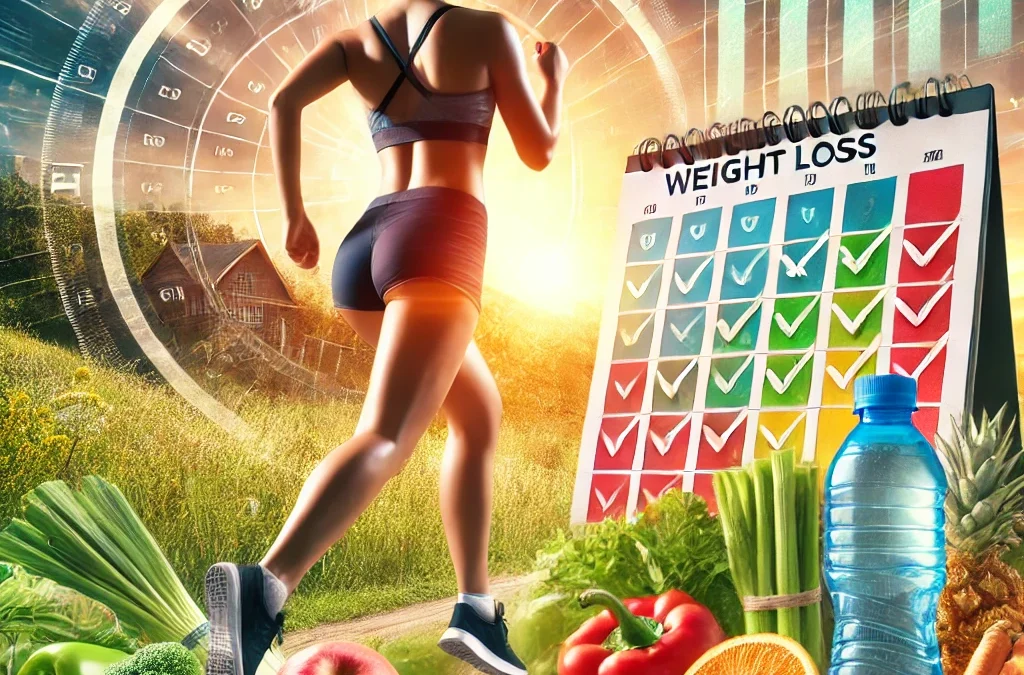How to Lose Weight Fast: The Ultimate Guide to Shedding Pounds Safely
Losing weight quickly is a goal for many people, especially when they have a special event around the corner or just want to feel healthier sooner. But while the idea of shedding pounds fast can be appealing, it’s crucial to approach it carefully. In this guide, we’ll explore how to lose weight quickly while prioritizing your well-being.
Why Losing Weight Quickly Can Be Tricky
Losing weight fast is possible, but there are a few concerns to keep in mind. While you may see dramatic changes in a short period, rapid weight loss can sometimes come with side effects like muscle loss, nutritional deficiencies, and even metabolic slowdowns. In worst-case scenarios, you might end up gaining back the weight (and sometimes more) once you return to regular eating habits.
So, while it’s tempting to dive into extreme diets or punishing exercise routines, it’s vital to balance speed with safety. Sustainable weight loss doesn’t mean you have to give up on quick results entirely, but it requires a strategic and healthy approach.
Set Realistic Expectations
Before diving into the strategies, set realistic goals for yourself. Losing 1–2 pounds per week is often considered a healthy and sustainable rate, but if you’re aiming for faster results, remember that everyone’s body responds differently. Factors like metabolism, starting weight, and how much you have to lose will affect how quickly you shed pounds.
Create a Calorie Deficit
The key to losing weight fast lies in creating a calorie deficit. This means burning more calories than you consume.
What is a Calorie Deficit?
A calorie deficit occurs when your body uses more energy (calories) than it takes in. When this happens, your body begins to tap into fat stores for fuel, leading to weight loss.
How Many Calories Should You Cut?
A typical recommendation is to reduce your daily calorie intake by 500–1,000 calories, which can result in about 1–2 pounds of weight loss per week. However, drastically cutting calories can lead to muscle loss and fatigue, so it’s important to find a balance that works for you.
Tools for Tracking Calories
Using apps like MyFitnessPal or Cronometer can help you monitor your daily calorie intake and ensure you’re staying within your goal range.

Focus on a High-Protein Diet
Protein plays a major role in weight loss. Not only does it keep you feeling full for longer, but it also helps preserve muscle mass, which is essential when you’re shedding fat.
Why Protein is Key to Weight Loss
High-protein diets help increase metabolism and reduce appetite. Eating more protein can also prevent the muscle loss that sometimes accompanies weight loss, ensuring that you’re losing fat instead of lean mass.
Protein-Rich Foods to Include
Some great sources of protein include lean meats like chicken and turkey, fish, eggs, dairy products like Greek yogurt, and plant-based options like lentils, quinoa, and chickpeas.
Reduce Refined Carbs and Sugars
Carbs and sugars are the main culprits behind quick energy spikes and crashes, leading to overeating and weight gain.
The Impact of Carbs and Sugars on Weight Gain
Refined carbs, such as white bread, pasta, and sugary snacks, can spike your blood sugar levels, causing hunger shortly after eating. This leads to more calorie consumption, making weight loss harder.
Healthy Alternatives to Refined Carbs
To lose weight quickly, replace refined carbs with whole grains, such as brown rice, oats, and quinoa, and add plenty of vegetables to your meals.
Increase Physical Activity
Exercise is essential for fast weight loss. It helps you burn more calories and improve muscle tone.
Types of Exercises that Burn Fat Fast
High-intensity interval training (HIIT) and cardio exercises like running, swimming, or cycling are excellent for burning fat fast. Strength training, on the other hand, helps you build muscle, which boosts metabolism even when you’re at rest.
Importance of Combining Cardio and Strength Training
A mix of cardio and strength training ensures you burn calories while toning your body, creating a lean, sculpted look as you lose weight.
Drink More Water
Water is a simple yet powerful weight loss tool.
How Water Helps with Weight Loss
Drinking water before meals can reduce your appetite, making you eat less. Staying hydrated also helps your metabolism run efficiently.
Tips for Staying Hydrated
Aim to drink at least 8 glasses of water a day, and consider adding a slice of lemon or cucumber for a refreshing twist.
Get Enough Sleep
Sleep is often overlooked in weight loss plans, but it’s just as important as diet and exercise.
The Connection Between Sleep and Weight Loss
Poor sleep affects hormones that control hunger, leading to increased cravings and calorie intake. Ensuring you get 7–9 hours of quality sleep each night can support faster weight loss.
How to Improve Sleep Quality
Create a bedtime routine, avoid screens before bed, and keep your sleeping environment cool and dark.
Intermittent Fasting for Quick Weight Loss
Intermittent fasting (IF) has become a popular method for fast weight loss.
What is Intermittent Fasting?
Intermittent fasting involves cycling between periods of eating and fasting. Popular methods include the 16:8 method (fasting for 16 hours and eating during an 8-hour window) and the 5:2 method (eating normally for 5 days and drastically reducing calories for 2 days).
Popular Intermittent Fasting Methods
The 16:8 method is one of the easiest for beginners, as it aligns with a normal eating schedule. Fasting helps reduce overall calorie intake, which can speed up weight loss.
Avoid Processed Foods
Processed foods are packed with hidden sugars, unhealthy fats, and empty calories that can hinder weight loss.
The Problem with Processed Foods
These foods are often calorie-dense but lack the nutrients your body needs. As a result, you may eat more of them and feel less satisfied.
Whole Food Alternatives
Opt for whole, unprocessed foods like fresh vegetables, fruits, lean proteins, and whole grains to nourish your body while keeping your calorie intake low.
Manage Stress Levels
Stress can cause weight gain due to the release of cortisol, a hormone that increases appetite and fat storage.
How Stress Leads to Weight Gain
Chronic stress often leads to emotional eating, which can derail weight loss efforts.
Stress Management Techniques
Meditation, yoga, deep breathing exercises, and spending time in nature are all effective ways to reduce stress.
Use Weight Loss Supplements Cautiously
While supplements may seem like a quick fix, they’re not always effective or safe.
Do Supplements Really Help?
Some weight loss supplements claim to boost metabolism or reduce appetite, but they often come with side effects and don’t

